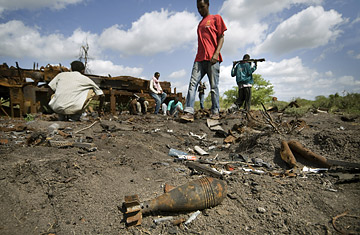
Wreckage and unexploded munitions litter the ground where American forces bombed a convoy of fleeing Union of Islamic Courts fighters in southern Somalia
The Somali village of Doble, bombed Monday by a U.S. missile that killed four civilians, is not a nice place. When I drove along Somalia's southern border with Kenya last June with photographer Sven Torfinn, we found an area riddled with thorn scrub, dust roads and mistrust. Because of the Islamist militants' hold on the area, we were traveling with an escort of 20 gunmen, crammed into the back of two pickups. When we came across villages, Sven and I would stay in the car, hiding under headscarves drawn over our heads, pretending to be women. The destination of our two-day off-road journey to one of Africa's remotest corners was the site of another U.S. air strike, in January 2007.
Walking around the site, we were interrupted by the arrival of a new-looking black SUV that our guards, who surrounded them, described as belonging to "al-Qaeda." The three men inside were armed, and their car was full of tea and sugar, which they said they were taking to a militant camp in the area. Our gunmen, outnumbering the militant trio and tired of bouncing around in the pickups, requested our permission to kill the "Qaeda" men. "Nice car," said the commander of our guard, to argue his case. We demurred and watched the SUV drive off, only for it to turn around and follow us at a distance. For the rest of the journey, the commander of our militia scolded us for our squeamishness.
Feeling braver a few hours later, we stopped in the village of Hosingo, perhaps an hour south of Doble, and talked to the village chiefs. We weren't given any lectures on Western immorality or the superior path of Islam. Instead, Adam Ibrahim Lagame talked about drought, poverty and starvation. It hadn't rained for a year. No aid had reached Hosingo since UNICEF built a school in 1996. "People are about to start dying here," said Adam. "The children have cholera and diarrhea. We have no food. Even if anyone was willing to come to help us, we have to have a telephone to tell them that we need them. You're the first white people we've seen in years." We asked about the militant bases in the area. Adam said all outsiders — both the militants, and the Ethiopian and U.S. warplanes that hunt them — were a curse. "The Americans bomb. The Ethiopians bomb. And the ICU threaten us on the ground," he said, using the acronym for the Somali Islamic Courts Union, driven out of Mogadishu by a U.S.-backed Ethiopian invasion. "None of these people are from here."
The ICU is a hard-line Islamist movement that ruled Somalia for 6 months in 2006, and which included a significant number of foreign jihadis in its ranks. When the Ethiopians attacked to drive the Islamists out of the capital, they were accompanied by a small number of U.S. Special Forces personnel who hoped to flush out three al-Qaeda commanders responsible for the 1998 bombings of U.S. embassies in Kenya and Tanzania. The bombers had been suspected of sheltering with the ICU. When the militants regrouped in the south, the U.S. saw its chance and launched two separate air strikes, followed by another strike from a U.S. battleship in the north of the country in June. Whom and how many the U.S. attacks killed has remained uncertain, as is the toll from Monday's attack. What is known is that at least one of the three 1998 bombers — explosives designer Tariq Abdullah, a.k.a. Abu Taha al-Sudani — was killed in an attack on a speeding car by an Ethiopian helicopter gunship early last year.
The three men we ran into in June said they worked for Hassan Turki, a senior ICU commander. I'd seen Turki speak on a videotape in early summer 2006, flushed with success after the ICU took over the country. "Tell George Bush we're all terrorists in Somalia," he'd shouted at the camera. "Tell Bush to attack. Tell him we're all terrorists here." Several reports on Tuesday claimed Turki's wishes had been granted, and that he himself was the target of the attack. The Pentagon, however, refused to specify either whether Turki had been the target or whether he was hit.
So, yes, Doble is a nasty area, home to some nasty people, saying and doing nasty things. But most of those aren't from Doble. From what Sven and I saw, Doble itself, like much of Africa and Arabia, is a place full of hospitable villagers struggling to survive amid what the U.N. says has now overtaken Darfur as Africa's worst humanitarian disaster, with 1.8 million people in dire need of assistance. And if drought, starvation and disease weren't enough, they now find themselves on the latest battleground in a global war between the U.S. and al-Qaeda. The victims of Monday's missile strike, say the villagers of Doble, were not the militants they fear, but four of their own. On Tuesday, the BBC reported that hundreds of women and children marched through Doble, chanting anti-American slogans.
